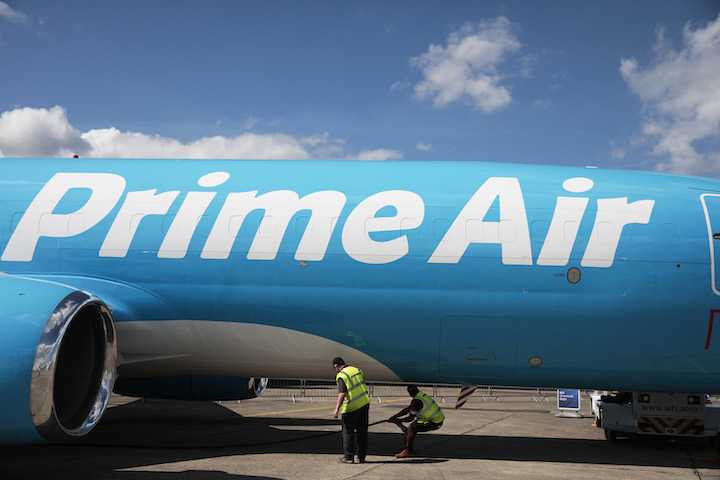Amazon Prime Air seen surging fivefold to 200 jets, rivaling UPS
Amazon.com Inc.’s Prime Air fleet will grow to about 200 planes—up from 42 now—in the next seven or eight years, creating an air cargo service that could rival United Parcel Service Inc., according to a study.

“At a time when many other airlines are downsizing due to the pandemic, Amazon’s push for faster and cheaper at-home delivery is moving ahead on an ambitious timetable,” said the report issued Friday by DePaul University’s Chaddick Institute of Metropolitan Development. “Amazon Air’s robust expansion makes it one of the biggest stories in the air cargo industry in years.”
Amazon unveiled the air cargo service in 2016, prompting speculation that it would ultimately create an overnight delivery network to rival delivery partners UPS and FedEx Corp.
Prime Air operates out of smaller regional airports close to its warehouses around the country, helping Amazon quickly move inventory to accommodate one- and two-day delivery. For that reason, some analysts have dismissed Amazon as a potential competitor to UPS and FedEx since it can only offer limited service to a small number of destinations and seems designed to handle Amazon packages.
Key to its ability to take on the entrenched players, the report says, is Amazon’s new $1.5 billion facility near Cincinnati that will accommodate up to 100 planes and as many as 200 flights each day. Amazon’s lack of a central hub has kept it from competing in the overnight delivery services offered by UPS and FedEx, which have more planes flying to more destinations.
“The massive investment being made in a large hub at Cincinnati/Northern Kentucky International Airport, however, could change everything,” the report says. “This hub appears to be the linchpin to Amazon’s efforts to develop a comprehensive array of domestic delivery services.”
A separate report released Monday noted Amazon’s lack of a central hub in concluding it was not a competitive threat to FedEx, which has a hub in Memphis, or UPS, which has one in Louisville. FedEx’s network can offer 9,000 daily flight connections, UPS’ 5,500 and Amazon Air just 363, according to the report from Bernstein.
“The viability of a commercial overnight offering from Amazon remains very limited,” Bernstein analyst David Vernon wrote. “Offering a low cost on shipping to a small number of markets every so often will never be a serious competitive threat.”
Similar Stories
IBA forecasts 25% increase in airline RPKs by 2030
In its January 2025 Market Update webinar, IBA’s experts forecast that RPKs will rise from 9.5 trillion in 2025 to 11.9 trillion in 2030 – an expected average annual growth…
View Article
2024 marks record air cargo year for Vienna Airport
View Article
“BelugaXL” as a guest at Munich Airport
View Article
Lufthansa Cargo appoints new executives for Europe and Middle East, Africa & South Asia & CIS regions
View Article
WorldACD Weekly Air Cargo Trends (week 2) - 2025
View Article
Manufacturing as fast as the supply chain will allow
View ArticleGet the most up-to-date trending news!
SubscribeIndustry updates and weekly newsletter direct to your inbox!





